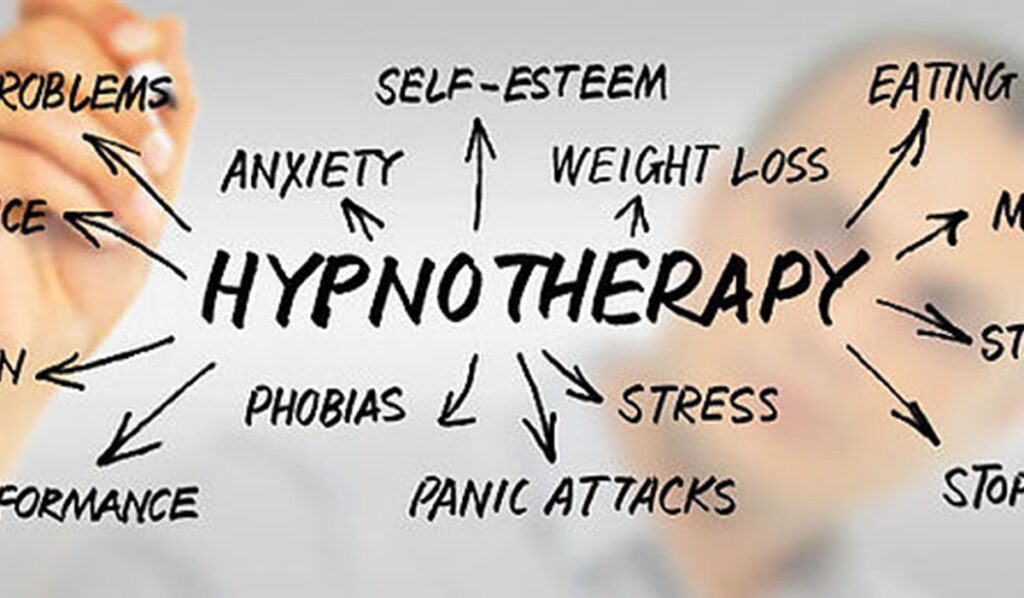Hypnotherapy
What is Hypnotherapy?
Hypnotherapy is a therapeutic technique that utilizes hypnosis to treat specific symptoms and health conditions. It’s also a personal growth tool to alter your perceptions, attitudes, and behaviors.
Hypnosis comes from the Greek word “hypnos,” meaning “sleep.” But unlike sleep, which lacks full awareness, you are fully aware of what’s going on.

What Is Hypnotherapy Used For?
Research has shown hypnotherapy is substantially effective in helping with:
- Treating mental conditions like anxiety, depression, stress, fears, panic attacks, sleep disorders, and PTSD.
- It can also help with obesity, addictions, chronic pain, and blood pressure.
- It can even alter your immune function to fight stress and reduce susceptibility to viral infections.
Additionally, according to some studies the average client receiving cognitive-behavioral hypnotherapy gets more significant improvement than the client receiving nonhypnotic treatment.

How Does Hypnotherapy Work?
If you have deeply rooted emotional wounds, hypnotherapy can help you heal them. In hypnosis, you can access subconscious regions of your mind and communicate with them directly—without the reasoning of your normal conscious thought.
During hypnosis, Cynthia induces a hypnotic state of waking awareness and focused attention, using suggestions, verbal cues, repetition, and mental imagery.
Although this state is similar to trance, you’re conscious of what’s happening around you. But instead of focusing on the external world, you are detached from it and entirely engrossed in your inner experience.
You can be guided back to some important event of your childhood that caused a traumatic experience or a seeded limiting belief. Once memories of the event are accessed, you can re-assign a new meaning to them.
For example, you may have experienced not being picked up from school. In a hypnotherapy session, the hypnotherapist will hypnotize you and gently guide you back to that day. You will recall it as clearly as if it was happening to you for the first time.
You will be as old as you were back then, standing outside in the rain, waiting for your parents to pick you up, feeling what you were feeling at that time: “I feel abandoned. I feel like I’m not loved and not enough.”
These beliefs of being abandoned, unloved, and not enough were downloaded into your subconscious mind when you were a small child and now affect you as an adult.
So hypnotherapy allows you to assign a better meaning to that event and reprogram your subconscious mind with a new belief that you are loved and enough.
Science-Based Hypnotherapy Benefits
Hypnotherapy is widely used as an effective tool to cope with daily stress, anxiety, and phobias, and even help heal PTSD. It can also help with pain control.
Let’s look at five benefits of hypnotherapy.
1. Sleep disorders
If you have insomnia, hypnosis can help you to fall asleep more easily, and sleep better.
2. Anxiety
Hypnosis is effective in treating anxiety. If your anxiety stems from a chronic health condition such as heart disease, it can ease it by encouraging your body to activate its natural relaxation response. In the same way, it can help cope with a phobia.
3. Irritable Bowel Syndrome (IBS)
Hypnosis can treat IBS. It helps improve symptoms such as constipation, diarrhea, and bloating. It can also help with secondary symptoms like nausea, fatigue, backache, and urinary problems.
4. Chronic pain
If you suffer from migraines, lower back pain, and pain related to arthritis, hypnosis can effectively help you cope with that.
5. Smoking/Vaping
You can quit the smoking habit with the help of hypnosis if you genuinely want to. Instead of focusing on quitting itself, hypnosis helps reprogram your subconscious mind towards the replacement action. It could be going for a walk or chewing a piece of gum.
Another way is to train your mind to associate this harmful habit with undesirable sensations like a disgusting taste in your mouth.
6. Weight loss;
Cynthia uses a powerful Hypnosis called, Gastric Band Bypass. In this hypnosis session she will take you into surgery where she will have the doctor put the band on your stomach and create new ways of thinking while you eat.
So you can use it for behavior change to start eating healthy and exercising regularly.
How do people describe the hypnotic experience?
People describe hypnosis in different ways. You may feel like you’re “zoned in” or in a trance-like state — so focused that you’re able to block out surrounding distractions. Many people say they feel calm and relaxed despite their increased concentration. Most described it as a pleasant experience.
The Trance State
A hypnotic trance is a heightened state of awareness, not a diminished one. When put into a hypnotic state, you will become intimately acquainted with your thoughts and habits. It’s the awareness that leads to change.
You will always leave a hypnosis session with the same morals you had when you started. Your conscious mind will never allow you to blindly accept suggestions, especially if they don’t make sense.
Some clients find they’re more open to discussion while in a trance state. They might notice or mention something about their thoughts that wasn’t obvious before.

Benefits of Hypnotherapy
Some people may experience dramatic results with hypnotherapy. In other cases, people may simply feel very relaxed. Some of the benefits of hypnotherapy may include:
- Awareness: Some people remain fully aware during the entire experience. They recall everything that happens and are even able to have conversations while under hypnosis. Other people may experience states of relaxation that are so deep that they may even feel detached from what is happening.6
- Focus: Most of the time, we are distracted by our surroundings. Whether the TV is blaring, your kids are demanding attention or your spouse wants to talk, it can be difficult to fully focus on yourself. Our conscious minds are also cluttered. You may be worried about paying a bill, concerned about an upcoming project, or planning tonight’s dinner. The therapy session is intended to break through these day-to-day concerns and allow you to focus completely on the problem at hand.1
- Relaxation: In the hypnotic state, you are deeply relaxed. Your conscious mind is quieted, allowing your unconscious mind to deeply focus on your issue. You are also calmer, and therefore more receptive to facing your problems or fears.1
Most hypnotherapists utilize a series of calming messages, such as “you are safe” and “no one can harm you” to reassure their clients that during hypnosis they can objectively face their problems without having a panicked reaction.
